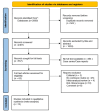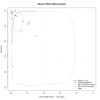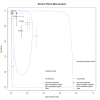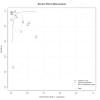Efficacy of AI Models in Detecting Heart Failure Using ECG Data: A Systematic Review and Meta-Analysis
- PMID: 40065863
- PMCID: PMC11891813
- DOI: 10.7759/cureus.78683
Efficacy of AI Models in Detecting Heart Failure Using ECG Data: A Systematic Review and Meta-Analysis
Abstract
Heart failure (HF) is the most common cause of death worldwide, characterized by low ejection fraction, substantial mortality, morbidity, and poor quality of life. Recent advancements in artificial intelligence (AI) present a promising avenue for enhancing diagnostic precision, particularly in the analysis of electrocardiogram (ECG) data. This systematic review and meta-analysis aim to synthesize current evidence on the diagnostic performance of AI models in detecting HF using ECG data. PubMed and Google Scholar databases were systematically searched from inception up to July 1, 2023, to identify original articles assessing the predictive ability of AI in HF diagnosis. A total of 218,202 participants were included, with individual studies ranging from 59 to 110,000 participants. The pooled sensitivity, specificity, and diagnostic odds ratio (DOR) for the 13 included studies, with a 97.5% confidence interval (CI), were 0.93 (CI: 0.81-0.98), 0.95 (CI: 0.89-0.97), and 303.65 (CI: 53.12-1734), respectively. The sensitivity and specificity ranged from 0.12 to 1.00 and 0.66 to 1.00, respectively, indicating substantial variability in AI model performance, which may impact their generalizability and clinical reliability. AI-based algorithms utilizing ECG data are a reliable, accurate, and promising tool for the screening, detection, and monitoring of HF. However, further prospective studies are needed, particularly randomized controlled trials and large-scale longitudinal studies across diverse populations, to evaluate the long-term clinical impact, generalizability, and real-world applicability of these AI-driven diagnostic tools.
Keywords: ai and cardiovascular disease; ai and ecg; ai and heart failure; ai and robotics in healthcare; efficacy of ai in cardiac medicine.
Copyright © 2025, Khan et al.
Conflict of interest statement
Conflicts of interest: In compliance with the ICMJE uniform disclosure form, all authors declare the following: Payment/services info: All authors have declared that no financial support was received from any organization for the submitted work. Financial relationships: All authors have declared that they have no financial relationships at present or within the previous three years with any organizations that might have an interest in the submitted work. Other relationships: All authors have declared that there are no other relationships or activities that could appear to have influenced the submitted work.
Figures







References
-
- Heart disease and stroke statistics-2020 update: a report from the American Heart Association. Virani SS, Alonso A, Benjamin EJ, et al. Circulation. 2020;141:0–596. - PubMed
-
- Malik A, Brito D, Vaqar S, et al. Treasure Island (FL): StatPearls Publishing; 2024. Congestive Heart Failure.
-
- 2022 AHA/ACC/HFSA guideline for the management of heart failure: a report of the American College of Cardiology/American Heart Association Joint Committee on clinical practice guidelines. Heidenreich PA, Bozkurt B, Aguilar D, et al. Circulation. 2022;145:0–1032. - PubMed
Publication types
LinkOut - more resources
Full Text Sources
Research Materials
Miscellaneous
